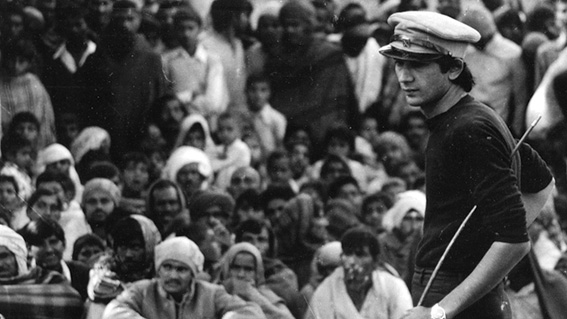National Street Theatre Day in India
Loud and clear, street plays in India are not just an art form, but also a means of voicing opinions and protesting; with some acts being monumental enough to leave their mark in the history of Indian theatre.
Street theatre is loud, so there is a slim chance of passing by an act and not getting involved. Actors clad in long white or black coloured kurtas, passionately and rather loudly march the streets of India, staging nukad-nataks or street-plays.
A means of communicating ideas, reciting stories, voicing opinions and also protesting, nukad-nataks are a quintessential form of traditional Indian theatre and it is to celebrate this art and remember the work of one of its legends, Safdar Hashmi, that the National Street Theatre Day is celebrated in the country. April 12, the day of the celebration, is in fact the birthday of Hashmi – a playwright, director, actor, lyricist, theorist and political activist.
Holder of a master’s degree in English from the renowned St. Stephens College in New Delhi, Hashmi was also part of the Indian People’s Theatre Association (IPTA) during his college days. IPTA is one of the oldest theatre groups in India and an association of artists trying to voice strong political opinions through their acts.
Hashmi was murdered on January 1, 1989 in Jhandapur, an industrial area in Uttar Pradesh. When the incident took place he was performing Halla Bol, a play on worker’s rights and one of his most popular street plays. He was attacked by a mob that came out to the streets backing their leader against the political ideologies of the theatre group and what they were contesting through the play.
The play, a reworked version of an earlier play Chakka Jam by Jana Natya Manch better known by its acronym Janam, was based on the November 1988 industrial strike in Delhi led by Centre of Indian Trade Unions (CITU). Staging of “small theatre”, as Hashmi dearly called street plays continues Janam’s moto. Born out of IPTA in 1973, Janam was Hashmi’s brain-child.
It was after the murder of Hashmi that people started praising the power and presence of street theatre despite the street play movement having already been initiated by IPTA. His death was an unusual event in the history of Indian theatre and one that shook up many – arts and artists, and all those who loved Hashmi for the man he was and for his craft. The days that followed his brutal demise saw thousands of artists, intellectuals and workers claiming the streets, showing their solidarity in a nearly 10-mile-long funeral procession. However, this show of support was not the only way by which Hashmi was given a tribute – Janam later went back to Jhandapur and finished the play that had been interrupted, with a much larger audience in attendance.
Commemorating days like the National Street Theatre Day show that it’s the power of words, acts, beliefs and communication tools like nukad-natak that survive despite all odds.










